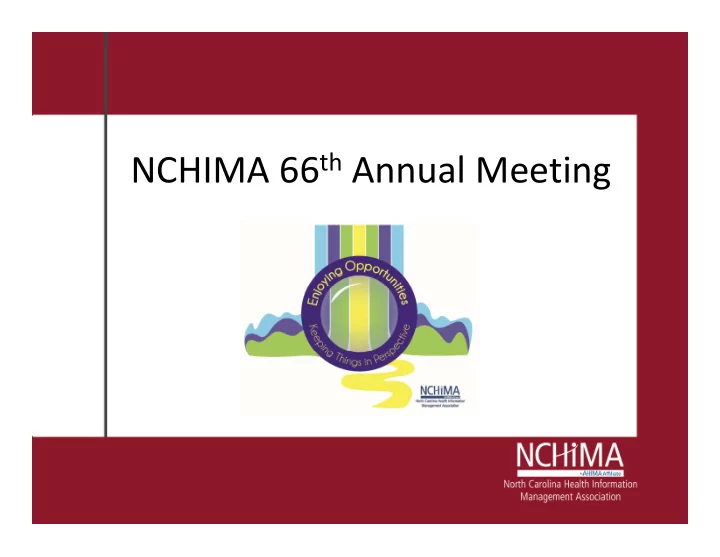

NCHIMA 66 th Annual Meeting
Integrating Leadership into Curriculum Sheryl Spohn, RHIA, CHC Transition Advisory Group and Evon Green, CCS‐P AMS Consulting Services
Agenda • Why are we here? • Take a minute to laugh… • Take a minute to take care of you… • Good reads • Good direction • Gain understanding of how we are programmed • See a good example
Do you ever feel like this? “The Mom Song”
Leadership Reminders to Ourselves • You’re doing a great job… • Thank you for this opportunity to …. • Mad / Glad / Sad • I ____________ someone today (gave, taught, believed)
Keep Learning – A Few Good Reads • 4 Disciplines of Execution by Sean McChesney & Sean Covey • Crucial Conversations by Kerry Patterson • Strength Finders by Tom Rath • Enegram Test by Riso‐Hudson – http://www.enneagramtest.netet/
What Personality are You?
Strengthsfinder • Background – The Gallup Organization, widely known for its polls and employee selection research developed numerous semi‐ structured interviews to identify talent that could be enhanced and used to pursue positive outcomes in work and school. – In the 1990s, under the leadership of Educational Psychologist Donald O. Clifton, Gallup developed the CSF as an objective measure of personal talent that could be… – Administered online in less than one hour. – This was followed by best selling books in: • 2001 – Now Discover Your Strengths • 2013 – StrengthsFinder 2.0 – Today, more than 13 million individuals have taken StrengthsFinder.
Strengthsfinder (cont…) • Technical Side ‐ Comprised of: • 177 pairs of “potential” self‐descriptors • The descriptors are placed as if anchoring polar ends of a continuum • You choose the descriptor that best describes you, and the extent to which it describes you • You only get 20 seconds before it moves on to the next item pair • Scientific Side – CSF is focused on optimal human functioning; focusing on happiness, strength, personal potential and greatest satisfaction. – Very simply stated, the CSF measures what you are naturally good at doing
Signature Strengths • Strategic • Relator • Achiever • Restorer • Activator • Arranger • Competitor • Wooer • Ideation • Discipline • Learner • Empathizer
Let’s Get Started… • Understanding who you are and what your strengths are helps you capitalize on those strengths to accomplish your Wildly Important Goals – specifically, helping you balance life and work • Achieving Results – Is “balance” one of the results you are trying to achieve? Results are made up of things you Can Can’t Control Control
Strategizing to Execute • Controlling the things you can Strategy Execution Stroke of Behavior the Pen Change • Best laid plans…
Whirlwind Goals Day Job New Activities
You can’t do it all… ”Rome was not built in a day…” 2‐3 4‐10 Number of Goals 11‐20 Goals Achieved 2‐3 1‐2 0 with EXCELLENCE
How do you Choose what to Focus On? Wildly Goals Importan t Goals
Measuring Success • Got to keep score to know if you are initiating change • Keeping score creates accountability • Monitoring the scoreboard creates habit
APPLYING IT TO BALANCING LIFE & WORK Across the Generations
Different Generations… Different Needs/ Interpretations • Baby Boomers – Born between 1946 and 1965 – Relish long work weeks and define themselves by their professional accomplishments – Believe in "face time" at the office and may fault younger generations for working remotely • Generation X ‐ Busters – Born: 1966‐1976 / Coming of Age: 1988‐1994 – Generation X values freedom and responsibility. Many in this generation display a casual disdain for authority and structured work hours. – “Work to live rather than live to work”
Different Generations… Different Needs/ Interpretations • Generation Y ‐ Echo Boomers / Milleniums – Born: 1977‐1994 / Coming of Age: 1998‐2006 – The first generation born into technology woven throughout their lives…Generation Y is plugged‐in 24 hours a day, 7 days a week….”blending of work and life” – Willing to trade high pay for fewer billable hours, flexible schedules, and a better work/life balance • Generation Z – Digital Natives – Born: 1995‐2012 / Coming of Age: 2013‐2020
What’s next?
GIVING BACK WHILE MOVING FORWARD Sample Case AMS Consulting Services
• Work – new career, promotions, education, obtaining credentials • Life – family, marriage, children, spiritual life, hobbies • Is there a balance?
THE “POD” PRINCIPAL TO WORK LIFE BALANCE
PRIORITIZE • Establish a clear vision of what you want to accomplish • Know when to say “No” • Seek input from others (family, employees, etc.)
OUTSOURCE • You don’t have to do it all by yourself • Identify and utilize resources • Take the “S” off of your chest
DELEGATE • Be willing to “hand over” • Trust your “team” • Develop “leverage” through people and technology
VISION BOARD Visualization is one of the most powerful mind exercises
……..Do not allow your vision to be driven by money! “WE MAKE A LIVING BY WHAT WE EARN, WE MAKE A LIFE BY WHAT WE GIVE”
SELF‐EVALUATION • Needs vs Wants • What have I been Given? • What do I have to Offer? • What will be my Legacy? • How can my Strengths Help Others?
PAYING IT FORWARD What does this mean to you?
“SERVICE TO OTHERS IS THE RENT YOU PAY FOR YOUR TIME HERE ON EARTH”. ‐ MUHAMMAD ALI
THE CONCEPT • It turns our focus away from ourselves • Its centered around giving rather than taking • It’s a win / win for all involved
IN PRACTICE • Acts of Kindness – Simple vs Big • The Universe – Tracking System • Relationships – Giver or Taker “ Kindness, like a boomerang, always returns”. ‐Author Unknown
LEGACY “What we do for ourselves dies with us, what we do for others and the world remains and is immortal”. ‐Albert Pine What will be your legacy?
CHALLENGE YOURSELF AND FINISH STRONG Are you up for the challenge?
Recommend
More recommend